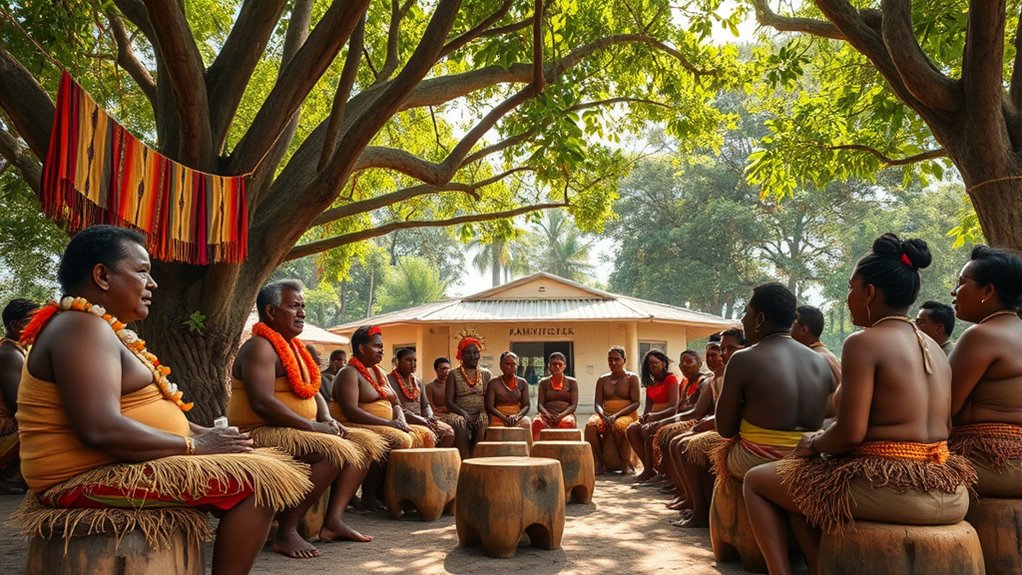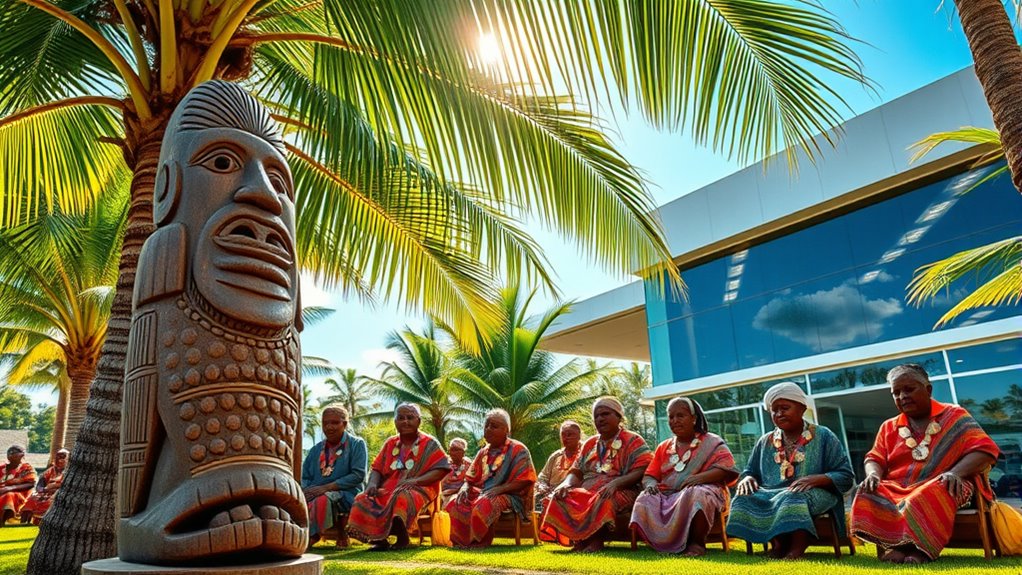In Vanuatu, kastom law is a crucial part of governance that works alongside formal legal systems. It reflects indigenous sovereignty, with communities using traditional customs and dispute resolution methods to maintain social order and cultural identity. Elders and local leaders mediate conflicts based on kastom principles, reinforcing community autonomy. Recognized by the government, kastom law respects local traditions while balancing modern legal needs. To learn how this coexistence shapes Vanuatu’s governance, keep exploring.
Key Takeaways
- Kastom law functions alongside formal legal systems, reinforcing indigenous authority and cultural identity in Vanuatu’s governance.
- It provides customary dispute resolution through elders, ensuring culturally appropriate and swift justice at the community level.
- The government recognizes Kastom law as a legitimate, complementary legal system that supports local autonomy and traditional practices.
- Challenges include aligning customary practices with human rights standards and modern legal safeguards.
- The coexistence of Kastom law and formal systems preserves indigenous sovereignty and enhances governance in rural areas.

Have you ever wondered how traditional customs influence modern governance in Vanuatu? It’s a fascinating blend where Kastom law, rooted in indigenous sovereignty, plays a crucial role alongside formal legal systems. In Vanuatu, Kastom law isn’t just an old tradition; it’s a living, breathing part of the country’s governance framework. Indigenous communities maintain their sovereignty by upholding customary practices that have been passed down through generations. These customs shape how disputes are resolved and how authority is exercised within communities, often functioning alongside or even within the national legal system.
You might find it surprising that customary dispute resolution remains a cornerstone of justice in Vanuatu. When conflicts arise—whether over land, resources, or social issues—many communities turn to their elders or local leaders to mediate. These elders apply Kastom principles to find solutions that honor local traditions, ensuring that the outcome aligns with community values. This process is quick, culturally appropriate, and highly respected, often serving as an alternative to formal courts. In this way, indigenous sovereignty is reinforced, as communities retain their ability to govern themselves according to their customs. It’s a essential expression of their autonomy, especially in rural areas where formal state institutions may have limited reach. Moreover, the integration of Kastom law into governance isn’t about replacing national law but complementing it. The government recognizes the importance of customary dispute resolution, allowing local customs to resolve issues where possible. This recognition affirms the authority of traditional leaders and supports the preservation of indigenous sovereignty. However, it also presents challenges, such as ensuring that customary practices align with human rights standards or national legislation. Still, the coexistence of Kastom law and formal legal processes underscores a respect for local autonomy and cultural identity. Additionally, AI security concerns highlight the need to balance traditional practices with modern safeguards to protect indigenous knowledge and community integrity.
Frequently Asked Questions
How Does Kastom Law Influence National Legislation in Vanuatu?
You see that kastom law influences national legislation by emphasizing cultural preservation and customary practices. It shapes policies that respect traditional customs while guiding modern governance. When laws are crafted, authorities often consider kastom norms to guarantee they align with local values. This integration helps maintain social cohesion, promotes respect for cultural heritage, and ensures that traditional practices continue to thrive alongside contemporary legal frameworks in Vanuatu.
Are There Conflicts Between Kastom Law and Constitutional Law?
You might wonder if conflicts arise between kastom law and constitutional law in Vanuatu. These conflicts often stem from the tension between cultural identity and legal pluralism. While kastom law reflects local traditions and customs, constitutional law aims for uniformity and national unity. Sometimes, these systems clash when traditional practices challenge constitutional principles, creating complex legal dilemmas that require careful balancing to preserve both cultural identity and the rule of law.
How Is Kastom Law Recognized in Urban Versus Rural Areas?
You’ll notice that in rural areas, kastom law is deeply rooted in traditional practices and closely linked to rural traditions, so it’s often recognized and respected. In urban settings, however, it’s more about urban adaptation, where kastom law is integrated into modern legal systems but may be less prominent. This difference reflects how traditional customs are preserved in rural communities while adapting to city life.
What Mechanisms Ensure Kastom Law’s Adaptation to Modern Issues?
You can see that mechanisms like community participation and cultural preservation efforts help kastom law adapt to modern issues. Local councils and traditional leaders work together to incorporate kastom practices into contemporary governance, ensuring relevance. These processes encourage dialogue between elders and youth, maintaining cultural integrity while addressing societal changes. This active engagement fosters respect for tradition and allows kastom law to evolve alongside modern challenges seamlessly.
Who Are the Key Authorities Responsible for Enforcing Kastom Law?
Oh, so you’re wondering who’s actually in charge of enforcing kastom law? Well, it’s mostly traditional leaders and community elders who hold the power. They’re the ones making sure customs are respected and followed. You might think the government’s involved, but nope—these local authorities keep kastom law alive, guiding their communities through age-old wisdom. They’re the real guardians, ruling with respect and a deep sense of tradition.
Conclusion
You can see that kastom law plays an essential role in Vanuatu’s governance, blending traditional practices with modern systems. Notably, over 80% of the population still rely on kastom law for conflict resolution, showing its lasting influence. By respecting these customs, you help preserve Vanuatu’s unique culture while supporting effective governance. Embracing both worlds ensures a balanced future where tradition and progress work hand in hand.










